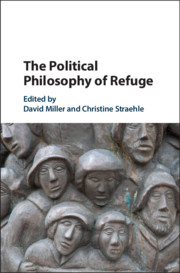Book contents
- The Political Philosophy of Refuge
- The Political Philosophy of Refuge
- Copyright page
- Contents
- Contributors
- Introduction
- Chapter 1 Differentiating Refugees
- Chapter 2 The State’s Right to Exclude Asylum-Seekers and (Some) Refugees
- Chapter 3 Asylum, Speech, and Tragedy
- Chapter 4 Border Rescue
- Chapter 5 Selecting Refugees
- Chapter 6 Refugees and the Right to Remain
- Chapter 7 The Duties of Refugees
- Chapter 8 Is Return the Preferred Solution to Refugee Crises?
- Chapter 9 Refugees and the Right to Return
- Chapter 10 Refugees, Rescue, and Choice
- Chapter 11 Philosophical Foundations for Complementary Protection
- Chapter 12 The Ethics of Sanctuary Policies in Liberal Democratic States
- Bibliography
- Index
Chapter 3 - Asylum, Speech, and Tragedy
Published online by Cambridge University Press: 01 November 2019
- The Political Philosophy of Refuge
- The Political Philosophy of Refuge
- Copyright page
- Contents
- Contributors
- Introduction
- Chapter 1 Differentiating Refugees
- Chapter 2 The State’s Right to Exclude Asylum-Seekers and (Some) Refugees
- Chapter 3 Asylum, Speech, and Tragedy
- Chapter 4 Border Rescue
- Chapter 5 Selecting Refugees
- Chapter 6 Refugees and the Right to Remain
- Chapter 7 The Duties of Refugees
- Chapter 8 Is Return the Preferred Solution to Refugee Crises?
- Chapter 9 Refugees and the Right to Return
- Chapter 10 Refugees, Rescue, and Choice
- Chapter 11 Philosophical Foundations for Complementary Protection
- Chapter 12 The Ethics of Sanctuary Policies in Liberal Democratic States
- Bibliography
- Index
Summary
In all three of these speeches, the concern of the speaker is at least partly directed toward the state from which that person is seeking asylum. President Johnson states that the Cuban Adjustment Act marks the Castro regime out as a moral failure – as a regime from which one must be rescued; this speech is directed to any number of audiences, but the Castro regime is certainly foremost among them. The government of Ecuador, similarly, uses the person of Julian Assange as a tool with which to criticize the criminal justice system of the United States. Chris Armstrong, in contrast, is deeply worried that the grant of “protected person” status to Denise Harvey will be viewed by the United States as a condemnatory judgment on the American legal system. His efforts to overturn the verdict here are best understood as efforts to negate the decision’s implicit judgment regarding United States – and, more importantly, to preserve the relationship between Canada and the United States.
- Type
- Chapter
- Information
- The Political Philosophy of Refuge , pp. 59 - 77Publisher: Cambridge University PressPrint publication year: 2019

